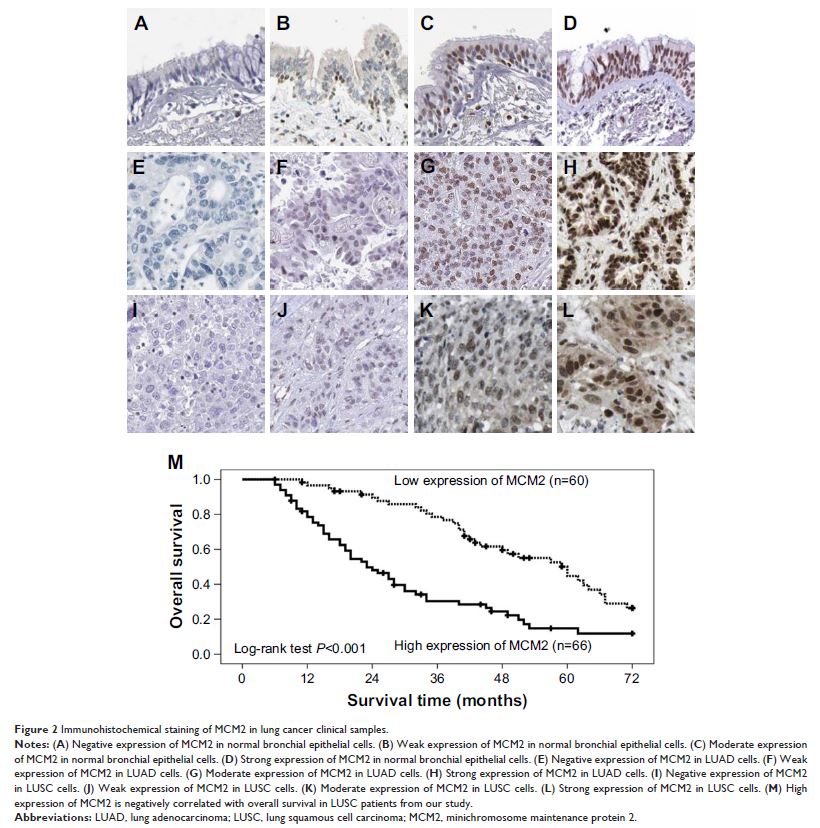108605
论文已发表
注册即可获取德孚的最新动态
IF 收录期刊
- 3.4 Breast Cancer (Dove Med Press)
- 3.2 Clin Epidemiol
- 2.6 Cancer Manag Res
- 2.9 Infect Drug Resist
- 3.7 Clin Interv Aging
- 5.1 Drug Des Dev Ther
- 3.1 Int J Chronic Obstr
- 6.6 Int J Nanomed
- 2.6 Int J Women's Health
- 2.9 Neuropsych Dis Treat
- 2.8 OncoTargets Ther
- 2.0 Patient Prefer Adher
- 2.2 Ther Clin Risk Manag
- 2.5 J Pain Res
- 3.0 Diabet Metab Synd Ob
- 3.2 Psychol Res Behav Ma
- 3.4 Nat Sci Sleep
- 1.8 Pharmgenomics Pers Med
- 2.0 Risk Manag Healthc Policy
- 4.1 J Inflamm Res
- 2.0 Int J Gen Med
- 3.4 J Hepatocell Carcinoma
- 3.0 J Asthma Allergy
- 2.2 Clin Cosmet Investig Dermatol
- 2.4 J Multidiscip Healthc

微染色体维持蛋白 2 与恶性状态相关,并调节肺鳞状细胞癌的增殖和细胞周期
Authors Wu W, Wang X, Shan C, Li Y, Li F
Received 22 March 2018
Accepted for publication 8 May 2018
Published 20 August 2018 Volume 2018:11 Pages 5025—5034
DOI https://doi.org/10.2147/OTT.S169002
Checked for plagiarism Yes
Review by Single-blind
Peer reviewers approved by Dr Colin Mak
Peer reviewer comments 2
Editor who approved publication: Dr Samir Farghaly
Background: Minichromosome maintenance protein 2 (MCM2), which is a member of MCM family, has been found to be a relevant marker for progression and prognosis in a variety of human cancers. Due to lack of effective therapeutic target in lung squamous cell carcinoma (LUSC) patients, the aim of our study was to screen and identify biomarkers which are associated to clinicopathological characteristics including prognosis in LUSC patients.
Methods: The expression status of MCM2 in lung cancer was analyzed using the publicly available Gene Expression Omnibus databases (GSE3268 and GSE10245). The mRNA and protein expression of MCM2 in lung cancer tissues and cell lines was detected by quantitative real-time PCR and Western blot, and the association between MCM2 expression and clinicopathological factors was analyzed by immunohistochemistry. The loss-of-function study of MCM2 was conducted in LUSC cell lines.
Results: In our study, we found MCM2 expression was increased in LUSC tissues compared with paired adjacent normal lung tissues or lung adenocarcinoma tissues through analyzing microarray data sets (GSE3268 and GSE10245), which confirmed that MCM2 mRNA and protein were overexpressed in LUSC tissues and cell lines. Meanwhile, we analyzed the association between MCM2 protein expression and clinicopathological characteristics of LUSC patients, and found high expression of MCM2 protein was obviously associated with malign differentiated degree, advanced clinical stage, large tumor size, more lymph node metastasis and present distant metastasis. The survival analysis showed MCM2 overexpression was an independent unfavorable prognostic factor for LUSC patients.
Conclusion: MCM2 is involved in the development and progression of LUSC as an oncogene, and thereby may act as a potential therapeutic target for LUSC patients.
Keywords: MCM2, lung cancer, lung squamous cell carcinoma, biomarker, proliferation, cell cycle
